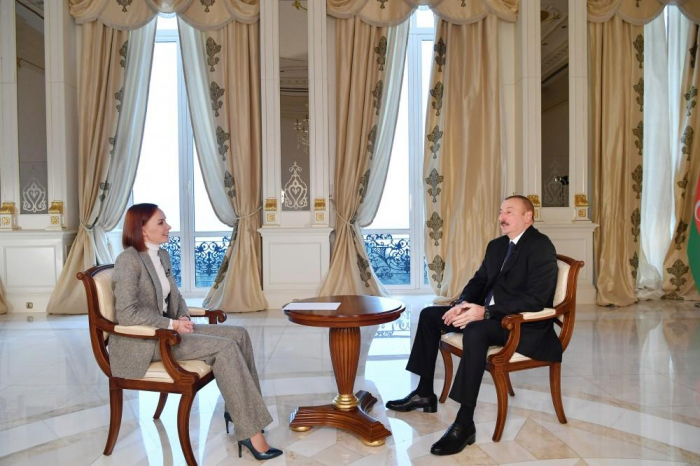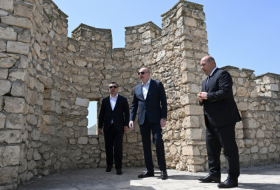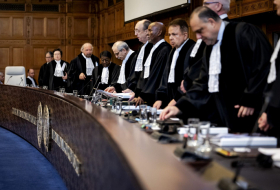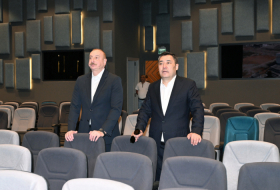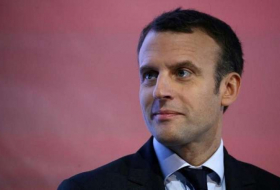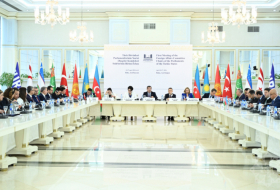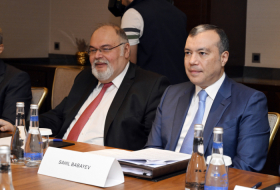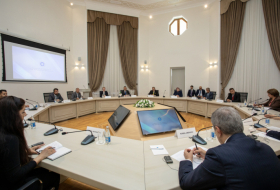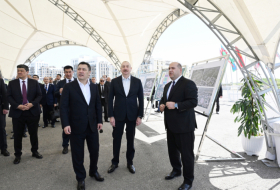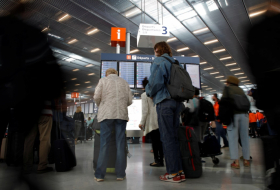- Hello, Mr. President.
- Hello.
- Year 2018 was not very easy for the world. But it is a good time to realize and appreciate the importance of relationships with historical partners, neighbors and friends. Therefore, we are very pleased and grateful to you for taking the time in your busy schedule to receive us today.
- Thank you.
- Mr. President, what are the political and economic results of 2018 for Azerbaijan?
- In general, the year has been successful for our country. Azerbaijan developed successfully. At the international level, we have strengthened traditional relations with our main partners, primarily with neighboring countries. The Convention on the settlement of the legal status of the Caspian Sea was signed. I believe that this is a historic document which brings Caspian littoral countries even closer together.
In a bilateral format, the year has been very active for us. We have held many bilateral meetings and actively participated in international organizations. An international forum at the level of foreign ministers of the countries of the Non-Aligned Movement was held in Baku. A summit will be held next year, and Azerbaijan will take over presidency in this largest international organization next year.
In terms of internal political processes, the country has successfully developed. There are no potential risks inside Azerbaijan. As for potential external risks, we are managing to protect ourselves from them. Of course, as always, we have attached great importance to economic reforms, and I think that 2018 was a very important year in this regard. Suffice it to say that according to the World Bank’s Doing Business report, Azerbaijan has climbed 32 steps and is now ranked 25th in the world. This shows that the reforms in the area of supporting private enterprise, transparency and entrepreneurship are producing good results. This, of course, raises our investment rating, and this year we have attracted $10 billion in investment. This makes investors feel confident and also demonstrates our determination to continue the policy of reforms. Inflation was slightly over 2 percent. Population incomes grew by more than 9 percent. We have increased our foreign exchange reserves. We keep our foreign debt at an acceptable level – it accounts for about 20 percent of the GDP. A strategy has been developed for the coming years to reduce the external debt to 10 percent of the GDP. I think it will be quite feasible. I should also say in this regard that our foreign exchange reserves are almost five times higher than our foreign debt. In other words, we can repay our external debt in a maximum of one year. So the macroeconomic situation is stable. We have resolved very many social issues. This year, about 6,000 IDP families were provided with new houses and apartments – about 30,000 people. In other words, a small city has been built for the most vulnerable during the year. I could continue this list, but I think that this, as it were, characterizes the main directions of our development.
- I believe that, as is the case with many developing economies in the CIS, including Russia, Azerbaijan is facing the task of increasing the economic growth rate. GDP growth of 1 and 3 percent is the expected rate for 2018. Where do you see the potential for a breakthrough today? In other words, if average global growth rates are 3 percent or more, then it is obvious that for our countries it is important to get closer to this indicator in order to keep up with the global economy.
- Yes, you are quite right. When we evaluate our performance in this direction and plan on future steps, we always separate the non-oil sector from the oil sector because the oil sector is sensitive to price fluctuations. It is also subjected to certain increases or decreases in oil production. Azerbaijan is an active participant in the OPEC+ program and we have recently taken on additional commitments to reduce production in order to show solidarity with all countries. Therefore, based on these factors, we always pay more attention to the non-oil economy and non-oil industry. And in this direction, I think, the results will be much better. At the end of 11 months, we are observing non-oil industry growth of more than 9 percent. This, first of all, is the result of our program of industrialization, non-oil sector development, small and medium-sized enterprises, and the creation of favorable conditions for the farmers. Our farmers are exempt from all taxes except for the land tax, and the state provides subsidies in the form of fertilizer, fuel, as well as production subsidies, so that we can become a more significant country in terms of agricultural exports. Therefore, the future development of our economy will, of course, always be backed up by the oil and gas sector, but sustainable development will be associated with industry, agriculture and high technology.
Among other significant events of this year I would mention the launch of our third satellite into orbit. Azerbaijan is already an active member of the international club of space-faring nations. We already have three satellites. This also speaks of our intentions and successes.
- Your special relations with Russia come to the foreground here because our cooperation in the non-oil sector is a priority and a long-term prospect. You have met with the Russian leader six times this year. This shows that both parties understand the importance of this interaction, the importance of these contacts. The creation of green corridors, the conditions for lifting restrictions for mutual trade, primarily for small and medium-sized businesses are being discussed. What do you see as the key decisions and timelines today? When should these decisions be made?
- You are right. Russian-Azerbaijani relations have developed very rapidly this year. In principle, our relations are characterized by dynamic development, stability and predictability. We are good neighbors and reliable friends. This has been proven more than once, and this high level of trust and, first of all, political interaction contributes to the implementation of many projects. You correctly noted that President Vladimir Vladimirovich Putin and I have met six times this year, including during my official visit to Russia and his visit to Azerbaijan. We have also met at international events. Each of these meetings produced results. We approach the issue of increasing our turnover very seriously and have adopted roadmaps for the development of different areas of cooperation. I am glad that both Azerbaijani and Russian business people are investing in the economies of our countries. Favorable conditions are being created for increasing the turnover and for the creation of joint productions. Russian banks are financing important industrial projects in Azerbaijan worth hundreds of millions of dollars. This is an indicator of our relations and also of the fact that Azerbaijan is a country in which banks are not afraid of losing money. We always honor our obligations.
We have identified plans for 2019. Just recently, a regular meeting of the Russian-Azerbaijani intergovernmental commission was held in Moscow. Also this year, a Russian-Azerbaijani interregional forum was held in Baku in the presence of the presidents of Russia and Azerbaijan. This is also an important area of our cooperation - active cooperation with Russian regions and building trade and economic relations with them. I think that our joint transport initiatives will give a serious boost to bilateral trade. The North-South project is already being implemented. This year alone, we are seeing a tenfold increase in transit of goods from Russia through Azerbaijan and to Russia. Our shippers are also using this transport artery very actively. So we have a comprehensive approach to our relations. The foundation is our historical friendship. On this foundation, we have built a strong basis for political relations and have a clear understanding on the development of trade, economic, transport, energy relations and, of course, relations in the humanitarian sphere. I must also say that Russians are ranked first for the number of tourists to Azerbaijan.
- And it is possible to understand them.
- Yes. This year, more than 800,000 Russians have visited our country. They feel very much at home here. In other words, our relations are quite extensive and, I think, are a good example of how neighbors should build relations.
- Mr. President, you have mentioned that Azerbaijan will take over presidency in the Non-Aligned Movement next year. But you can also use this possibility to develop relations with the Eurasian Economic Union. This is also an area that cannot be avoided, and there are opportunities to strengthen relations and contacts not only on a bilateral basis but also within the Eurasian community.
- Yes, of course, and we are working in this direction. I must say that we have very close and friendly relations with the absolute majority of Eurasian Union member-states, including those in the trade and economic sphere. We have free trade agreements with these countries. Of course, our main trade and economic partner is the Russian Federation. We also have a free trade format. Therefore, we will certainly expand the potential for cooperation. At this stage, this cooperation is more bilateral, sometimes trilateral, but not broader. Time and specific results will show how events will unfold next year. But, ultimately, as a country chairing the Non-Aligned Movement, we will increase our role in the international arena and, of course, strive to ensure that Azerbaijan’s partner-countries receive the same level of support from us that they are providing us with.
- I cannot but mention your energy projects and energy ambitions in the world market. Today we are witnessing a unique combination of Russia-Turkey-Azerbaijan and the way Russia and Azerbaijan are directing gas flows to the European Union through Turkey. Attempts were often made to set us against each other, to label us as competitors, but it is quite obvious that we are creating the energy security of the European Union for the benefit of our states today. What do these projects mean to you? What did the opening of the Southern Gas Corridor mean to you?
- I believe that the current situation you have described is exactly what was supposed to happen. We were moving towards that for a long time, perhaps from different directions and at different speeds, but as a result we have reached exactly what you are saying – a format of cooperation involving Russia, Turkey and Azerbaijan has emerged on the world’s energy map, and it has great prospects in both bilateral and trilateral terms.
We began to implement our energy projects in the early 2000s – with the construction of oil and gas pipelines. In order to access global markets, we had to build the infrastructure. We do not have access to the world ocean. Russia took steps in this direction relatively recently although we do remember that the Blue Stream project was implemented many years ago. It has somewhat been forgotten now. But it is also about the construction of a gas pipeline from Russia to Turkey through the bottom of the Black Sea. In other words, in principle, there is nothing new in what happened this year – the opening of the offshore phase of the Turkish Stream. The high-level political interaction between Russia and Turkey has provided the opportunity to implement or accelerate the implementation of this project. Therefore, as friends of Russia and Turkey, we have welcomed this project and attended the opening ceremony of this project at a high government level.
As for the Southern Gas Corridor project, it was officially launched in May this year. This is a project that combines four important independent projects. It is the development of the largest gas condensate field of Shah Deniz and the construction of three integrated gas pipeline systems. To date, three out of four segments of this project have already been implemented. The official opening of the Southern Gas Corridor in May was followed by the launch of the TANAP project in June. Thus, we will be transporting more gas to the Turkish and then to European markets. This is also a continuation of our policy, because back in 2007 we launched a gas pipeline from Baku to the Turkish city of Erzurum and currently export gas to the Turkish market. The Southern Gas Corridor will enable us to double gas exports to the Turkish market and to access the markets adjacent to Turkey and further Western Europe. This will give us the opportunity to realize our major gas potential and fetch billions of dollars to the treasury. This has already created tens of thousands of jobs and, of course, is creating a completely new energy map of Eurasia. The combination of the efforts of Azerbaijan, Russia and Turkey in this direction will not only allow us the opportunity to fully implement our plans and secure our interests, but also enable us to pursue a predictable policy in terms of the development of our energy resources and their transportation.
- I can immediately say a few words about the predictable policy of competitors. The stronger the country and the bigger its successes, the greater pressure is put on it. The struggle for energy influence is obvious here. You can look at Russia and the pressure from Western countries, first of all, from the United States. We are subjected to that precisely because of our energy plans in Europe. Are you ready to join? This has side effects.
- The point is that we have never felt such pressure in terms of the development of our energy projects. I would even say the opposite. Since Azerbaijani gas will, to a certain extent, ensure the energy security of European countries, we have felt the support of the European Union. Meetings of the Advisory Council on the implementation of the Southern Gas Corridor project are held in Baku every year. Since several EU member-countries are involved in this project, the European Union is always represented at meetings of the Advisory Council at a high level. We are implementing our energy projects because we need them, because we are a country rich in oil and gas reserves. We need to sell them and earn money. Therefore, we have attracted investor companies, so we attracted banks, we are building gas and oil pipelines. The Southern Gas Corridor alone costs about $40 billion. Most of this investment is borrowed capital. Therefore, of course, active cooperation with international financial institutions is an important factor in this project.
Therefore, in this context, in terms of energy projects, we do not feel any obstacles. On the other hand, you are quite right that the significance and role of Azerbaijan not only in the energy market but also in general, in geopolitical terms, is growing. The country is becoming more developed, has more plans to assert itself in the region. And in proportion to our development and to how we conduct independent policies, pressure on us is growing. But it is not connected with energy factors, it is connected with attempts to involve us in some adventures that are absolutely contraindicated for our people and our country. At the beginning of our conversation, I mentioned that there are no potential risks and threats in our country – physical, ideological, social or political. Whatever can undermine the peace of our citizens can be brought in from the outside. Therefore, we are very careful about issues related to our sovereignty. We are very sensitive to this, to issues related to our security, to the security of our citizens. Therefore, attempts to drag Azerbaijan into some kinds of international adventures have always suffered a fiasco. Some people may not be impressed with that, and we occasionally see these results. As a rule, this is manifested through the adoption of some resolutions by international organizations we are not even a member of.
- Or allegations of human rights violations…
- Absolutely correct.
- A favorite topic.
- Exactly. Moreover, it is strange when resolutions against us are adopted by organizations we are not a member of and are not going to join. This causes more and more smiles, so to speak. Also, of course, fake media stories are actively used. This is a favorite method of vilification, blackmail and attempts to exert pressure. But we have already developed an immunity against this. The people of Azerbaijan understand very well what is behind these attempts. The confident and steady development, safe development, stable development of Azerbaijan is the best answer to all those who want to harm us.
- The wider and deeper the cultural and educational exchange, including one between our countries, the more educated the people, the easier and quicker they will figure out the truth and fiction. I cannot but return to our historical ties, to our relations. Azerbaijan has always, for all these 27 years since the collapse of the Soviet Union, been a country where the Russian language feels at home. This probably explains such a flow of tourists to Azerbaijan. How many schools teach in Russian today? Who goes to Russia to receive education today? It is also very important for us because it is a bond for the future, it is a bond of future generations.
- In Azerbaijan, there are more than 340 schools with teaching in the Russian language, and the Russian language is taught in more than 3,000 schools. For comparison, I can say that there are about 4,500 schools in the country. The absolute majority of our schools teach Russian, and more than 340 schools provide teaching in Russian. The number of such schools is growing. In this case, our policy towards preserving the Russian language is producing good results. I often visit schools, especially on the eve of a new school year. I see that new Russian-language departments are being established and there is such a need. Of course, every citizen of the country should first of all speak our state language, and we have no problems with this in Azerbaijan. The state language is Azerbaijani, and all records management is conducted in Azerbaijani, as should be the case. But knowledge of the Russian language is both a necessity and a tribute to our historical ties. I see how this is claimed by society today. You are absolutely right that about a million Russians coming here. I think they first of all come here because they feel comfortable, in a comfortable environment. And this is very important. Therefore, our policy to preserve the Russian language, to create the best conditions for its development is absolutely correct, and we are seeing positive results of that. By paying tribute to the Russian language, we do not impair our own language in any way. This is simply impossible. I believe that the present-day development of Azerbaijan is an example of how one can combine national characteristics and identity with being open to the world and, above all, to relations with neighbors. In recent years, we have also created two branches of leading Russian universities – the Lomonosov Moscow State University and the Sechenov Medical Academy, where training is conducted by teachers from Russia in the Russian language. Therefore, the cultural and humanitarian sphere, the educational sphere – this is an area that will always contribute to the relations between our countries and peoples. You have noted that 27 years have passed since the collapse of the Soviet Union, and a new generation has grown up. Of course, we want the citizens of Azerbaijan to speak both Russian and English. First of all, of course, they should speak their native language. We want them to speak as many languages as possible and be able to easily communicate without an interpreter.
- Russian is the language of international communication. We are talking about the Russian language in this context, and of course, let me stress again that this will prove that what we are discussing and doing today will not be in vain if future generations know and appreciate the partnership laid down by their ancestors. Mr. President, what are your expectations for 2019? What events do you suppose will play an important role in the life of Azerbaijan and in the life of our countries? What would you like to resolve?
- I am sure our country will develop progressively in 2019. A large part of the reforms we are carrying out will manifest themselves in 2019. We will complete the process of transformation of the Azerbaijani economy. Therefore, I think that in terms of economic development, all our plans will be implemented. The state budget has already been adopted. As always, it will be socially oriented. Therefore, all social programs will be implemented. Next year we plan to commission more than 4,000 apartments for the internally displaced persons and refugees and more than 800 apartments for the families of those killed during the war between Armenia and Azerbaijan. In other words, the social focus of our economy will be very significant.
I think that important steps will be taken in 2019 to turn Azerbaijan into an international transport center. The "North-South" and "East-West" projects pass through Azerbaijan today. We are the only country involved in these two projects, and the number of countries joining these projects is growing every year. We have created the most sophisticated transport infrastructure in Azerbaijan – railways, sea, air, six international airports, roads. I can say that according to the Davos Economic Forum, Azerbaijan ranks 34th in the world for the quality of highways. This is a fairly high indicator which shows how much attention we are paying to these projects. Of course, as a country chairing the Non-Aligned Movement, we will work actively in the international arena and provide support to member-countries.
Of course, we also hope that there will be positive changes towards resolving the Armenia-Azerbaijan Nagorno-Karabakh conflict in 2019. I think that the events that occurred in Armenia this spring are a clear indicator of the futility of the policy towards maintaining the status quo on the part of Armenia. Over these years, we have covered a very long road of development, and the balance of the economic potential and all other components between Azerbaijan and Armenia has long been disrupted. I think that our policy towards increasing the economic potential and implementing energy and transport projects has, to a certain extent, been the reason for what happened in Armenia. In addition to all the other issues that troubled Armenian society, one of the factors of this spring’s events was the difficult socioeconomic situation Armenia found itself in or brought itself to. I am deeply convinced that this happened because the Armenia-Azerbaijan Nagorno-Karabakh conflict remains unresolved. Therefore, I think that both Armenian society and government will have a greater understanding that Armenian economy can significantly grow only in the event of a fair settlement of the conflict and liberation of the occupied territories. Otherwise, I think it will be difficult to expect any serious results of social and economic reforms in Armenia.
In other words, we are seeing the results of our policy. We have always wanted and still want to resolve the conflict through negotiations. But, of course, in order to resolve it through negotiations, we need very serious leverage. We have been pursuing and will continue to pursue a policy of demonstrating what advantages peace will bring to the region and what difficulties will exist in Armenia if there is no peace. I am deeply convinced that the only way for the new Armenian leaders to be able to carry out all their plans on transforming the country is to resolve the conflict with Azerbaijan. And to do that, they need to vacate the territories that do not belong to them and enable hundreds of thousands of Azerbaijanis to return to their lands. Therefore, there is hope that there will be more understanding in this regard. But I cannot predict, as they say, time will tell. But we will also consistently conduct the policy I spoke about earlier, especially since it is bearing fruit.
- Strategic patience, endurance, balance and focus on self-development is the choice for Azerbaijan in 2019.
- Absolutely right. You have clearly formulated what we are planning and doing.
- I wish you success. Thank you very much for this interview and all the best.
- Thank you. It is always a pleasure to see you. I want to take this opportunity on the eve of the New Year to wish the Russian people all the best, peace, prosperity and happiness in the New Year.
- Thank you!
More about: Russia Azerbaijan








